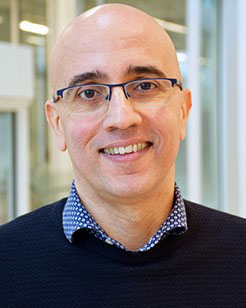Professor Santo Fortunato
Santo Fortunato, Ph.D., FAPS is Director at the Indiana University Network Science Institute (IUNI) and Professor at the Luddy School of Informatics, Computing, and Engineering (SICE), Indiana University Bloomington.
Santo is best known for his work on network community structure, leading to advances in multiresolution approaches and validation methods. He has also contributed to various topics in network science, such as network embeddings, multilayer networks, network models, social dynamics, scientometrics, and climate science. Read 20 years of network community detection and Community detection in networks using graph embeddings.
At Indiana University Bloomington, Santo leads his CoNeX Lab at the Center For Complex Networks and Systems Research.
Previously, between 2011 and 2016, he was Professor of Complex Systems at the Department of Computer Science of Aalto University in Espoo, Finland. Santo worked on the theory and applications of complex networks, the mathematical modeling of social phenomena, and the science of science.
As the NSF AccelNet-MultiNet Hub project leader, Santo attended the first meeting on Future Directions in Multilayer Network Science in July 2022 which was hosted by the Northeastern University Network Science Institute.
Santo is the Co-Investigator of the grant KBASE2: Korean Brain Aging Study, Longitudinal Endophenotypes and Systems Biology (August 2021–August 2026), a project funded by the National Institutes of Health with the goal of identifying biomarkers for early detection of Alzheimer’s disease. Read Researchers receive multi-million dollar grant to study early detection of Alzheimer’s Disease.
Since 2021, Santo has been the PI of the grant “Multilayer network embeddings and applications to real-world problems.” The project is funded until 2024 by the Army Research Office that aims to develop embeddings of multilayer networks. Read Fortunato, Radicchi earn grant from Army Research Office to study multilayer networks.
Santo earned his Master of Science Degree in Physics from the Department of Physics at the University of Catania, Italy in 1995. He earned his Ph.D. in Theoretical Physics in 2000 at the Department of Physics at the University of Bielefeld, Germany, working on lattice gauge theories, percolation, and phenomenology of heavy-ion collisions. Read his thesis Percolation and Deconfinement in SU(2) Gauge Theory.
He switched to complexity science in 2004 and between 2005 and 2007 worked as a postdoctoral researcher at the School of Informatics and Computing of Indiana University with Alessandro Vespignani. He then joined the ISI Foundation in Turin, Italy, first as a research scientist and then as a scientific leader until 2011.
In 2011, he moved to Aalto University, Finland, where he was a full professor in the Department of Computer Science before returning to Indiana University.
Santo is the coauthor of the book A First Course in Network Science, coauthored with Filippo Menczer and Clayton Davis. It is possibly the most accessible textbook on the topic, requiring only minimal background in math and programming, it includes almost 200 exercises and Python tutorials and teaches the reader how to play with networks from scratch. It has been ranked number one in the list of Amazon’s hot new releases in physics.
His next book Cluster Analysis in Graphs is scheduled to release in 2023.
Santo has received several honors and awards for his research, including being elected Fellow of the American Physical Society for foundational contributions to the statistical physics of complex networks and elected Fellow of the Network Science Society for seminal work in network community structure leading to advances in multiresolution approaches and validation and for contributions to disseminating network science.
Santo has published over 160 papers in peer-reviewed journals and conferences, with more than 36,000 citations. His research has been published in leading journals, including Nature, Science, PNAS, Physical Review Letters, Reviews of Modern Physics, and Physics Reports.
He received the Young Scientist Award for Socio- and Econophysics 2011, a prize given by the German Physical Society, for his outstanding contributions to the physics of social systems. He is the Founding Chair of the International Conference of Computational Social Science (IC2S2), which he first organized in Helsinki in June 2015. He was General Chair of Networks 2021, the largest ever event on network science, held virtually in July 2021.
Some of his most influential papers include Community Detection in graphs which is one of the best known and most cited papers in network science, Resolution limit in community detection, On the consensus threshold for the opinion dynamics of Krause-Hegselmann, and Robustness modularity in complex networks.
Read Assessment of network module identification across complex diseases and Collaboration and topic switches in science. Read Googlearchy or Googlocracy? Conventional wisdom says that search engines make big websites even more prominent. New research, though, says “not so fast” on jumping to that conclusion.
Watch his Video Lectures.
Visit his LinkedIn profile, Homepage, Indiana University Academic Page, Amazon page, ResearchGate page, ORCiD, and his dblp profile. Follow him on Research, Facebook, Instagram, X, Google Scholar, and Digital Library.
